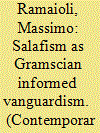|
|
|
Sort Order |
|
|
|
Items / Page
|
|
|
|
|
|
|
| Srl | Item |
| 1 |
ID:
191625


|
|
|
|
|
| Summary/Abstract |
In this study, I offer a categorization of Salafism based on the concept of vanguardism. Vanguardism suggests how Salafis inhabit the political domain, by posing as the vanguard of a privileged group endowed with a historical mission. Relatedly, I summon the Gramscian concept of “philosophy of praxis.” With this, I intend to reconfigure Wiktorowicz’s classificatory scheme predicated on too stark an opposition between ‘aqīdah (theory) and manhaj (method). The philosophy of praxis accounts for the inherent tension between these two domains. Such tension is manifest in Salafis’ ambiguities, compromises, internal rifts, ideological adjustments, and revisions. Two related Gramscian concepts, historical bloc and modern Prince, bring such considerations more immediately into the political. They highlight, respectively, the political-historical context in which Salafis operate and the political-historical role they play as instances of vanguardism. I then put forth my classificatory scheme in the form of a typology. One axis is represented by the attitude towards the “historical bloc” (pro or anti) and the kind of vanguard posturing that emerges out of it (support, creation, or activation). The other axis is represented by the specific framing of the “Enemy” category on the part of the Salafi vanguard (historical/institutional or essential/identitarian), and the stance they consequently assume towards it (compromise/accommodation or rejection/denunciation). The resulting classification offers six categories (accommodationists, partisans, delayers, agitators, mobilizers, and belligerents). Stressing the fundamental political nature of contemporary Salafism—its vanguardism—they account for its inscription in a specific, modern way of thinking and acting the political.
|
|
|
|
|
|
|
|
|
|
|
|
|
|
|
|
| 2 |
ID:
179445


|
|
|
|
|
| Summary/Abstract |
This multidisciplinary pedagogy offers eight allegorical images in support of a visually contextual reading of The Prince. Responding to the pedagogical problem of students treating the text as an ahistorical manual for action addressed to them, our approach resituates The Prince in its visual cultural context. This allows us to specify Machiavelli’s innovations as a theorist in terms of the importance of plurality and particularity in regard to political action. An online supplemental appendix provides access to databases and additional resources. Exploring Machiavelli’s politicized moral concepts of prudence, parsimony, liberality, fortune, and impetuosity using these images, we show his masterful invocation and redeployment of the cultural codes of his time. In presenting a visual history of concepts, we hope to move students beyond common contemporary ideological biases and literal readings and to alert them to the complex stories and relationships evident in the visual history of civic humanism.
|
|
|
|
|
|
|
|
|
|
|
|
|
|
|
|
|
|
|
|
|